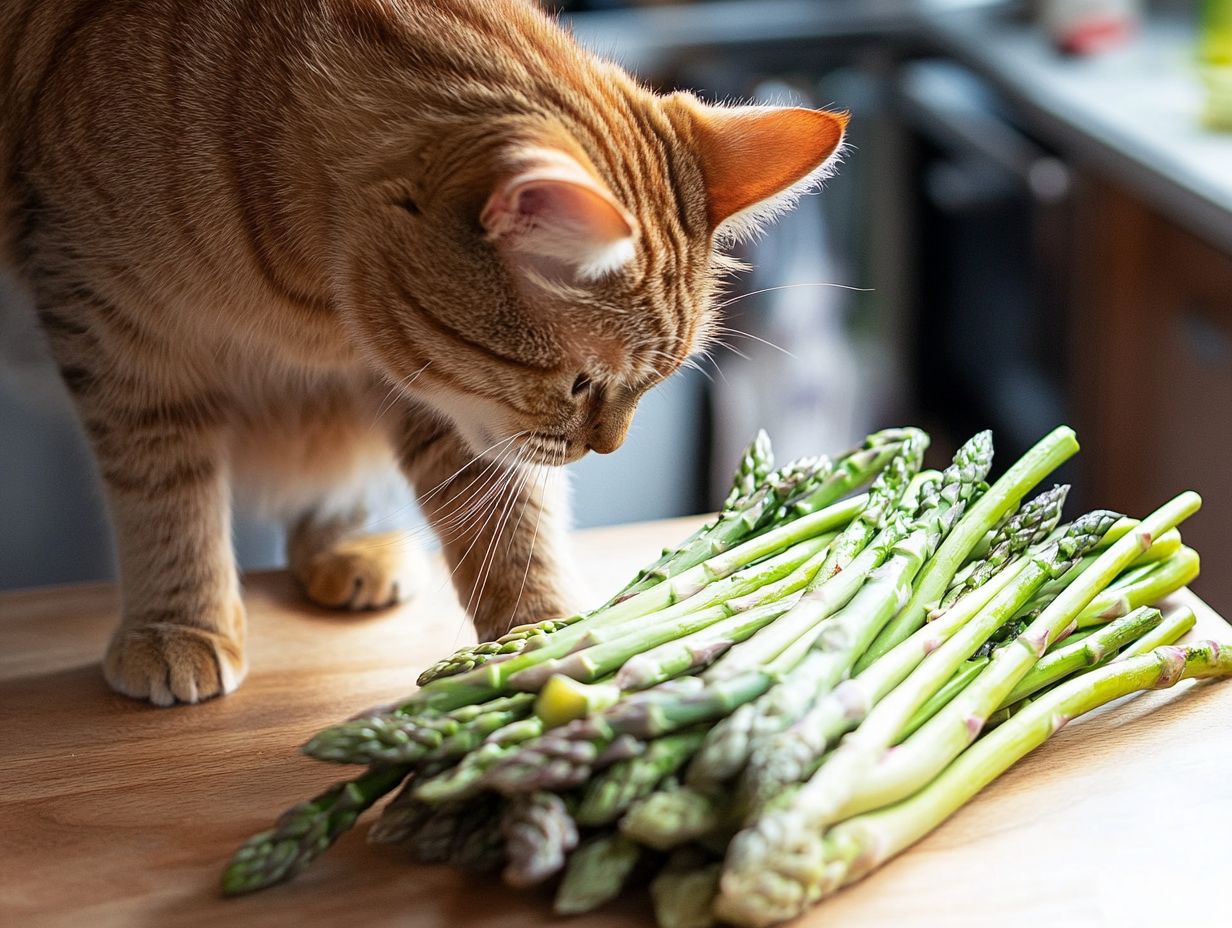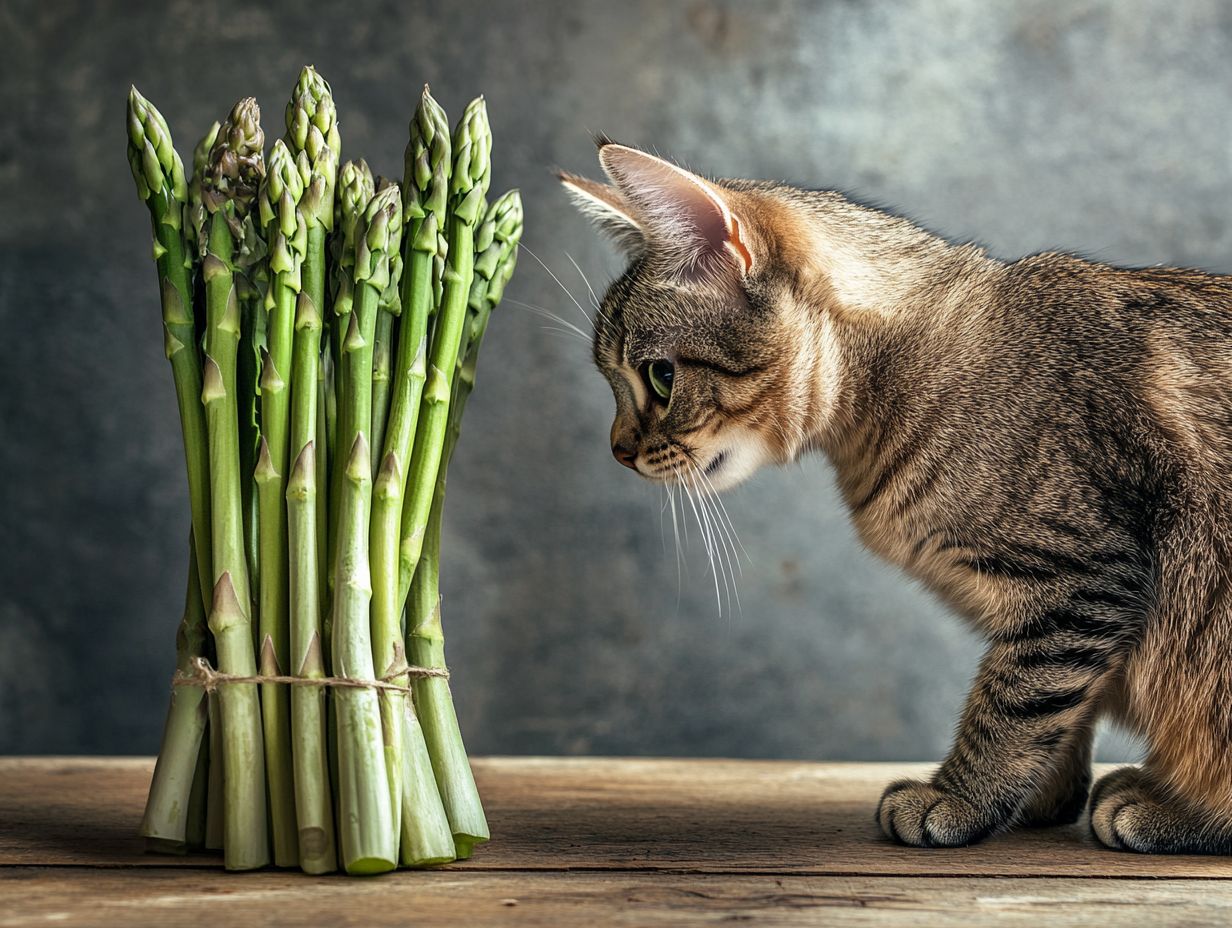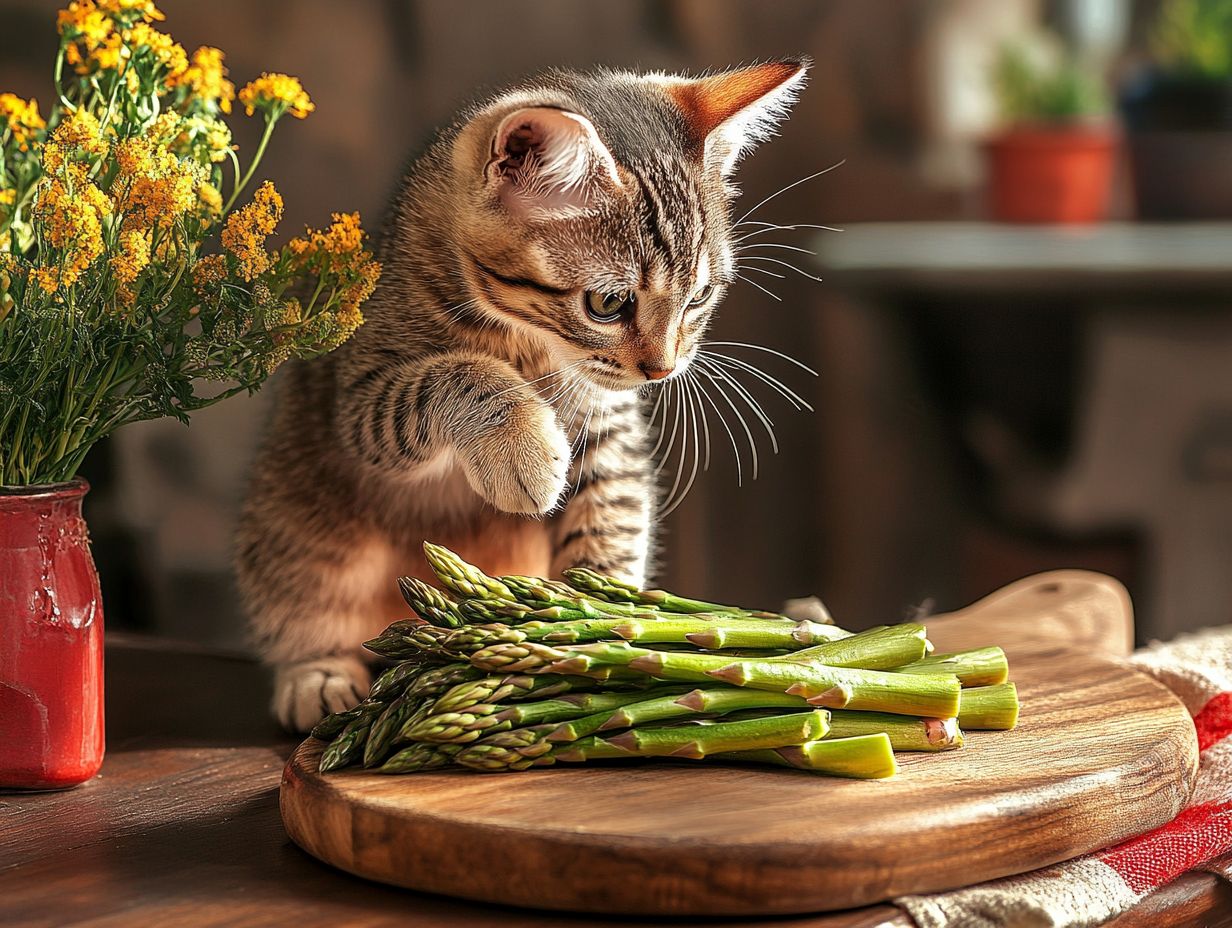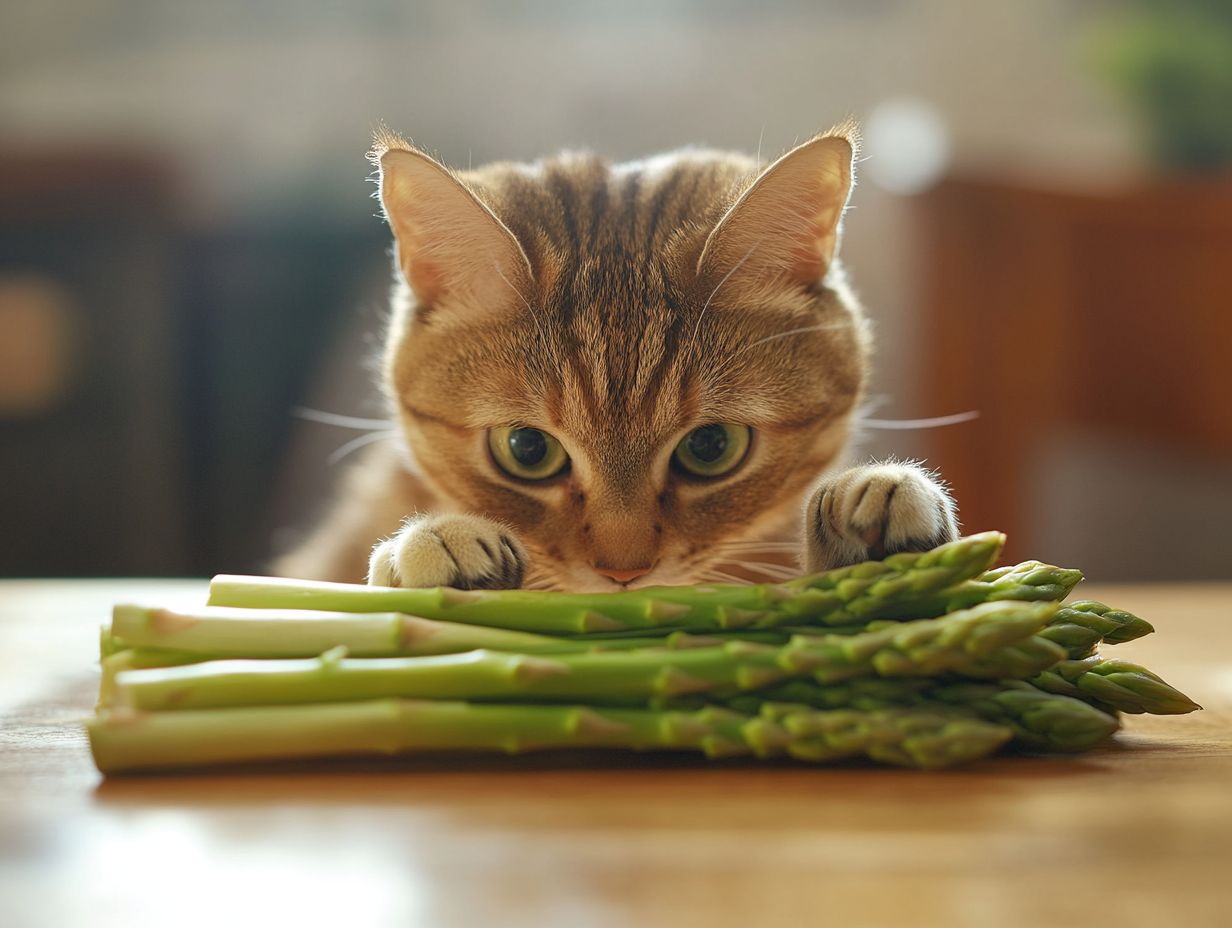Curious about whether your feline friend can enjoy asparagus? Asparagus is generally safe for cats in moderation, but it’s essential to understand its benefits and risks before adding it to their diet. This article breaks down everything you need to know.
From the potential health benefits asparagus might offer to the risks involved, we cover it all. You’ll also find tips on how to safely incorporate this green into your cat’s meals and discover alternative veggies that are safe for your furry companion. Read on to make informed choices for your pet’s health!
Key Takeaways:

- Feeding asparagus to cats can provide health benefits due to its nutritional value, but it’s crucial to understand the risks and precautions beforehand.
- Possible allergic reactions and digestive issues should be considered before incorporating asparagus into your cat’s diet.
- If asparagus isn’t suitable for your cat, consider safe alternatives like cooked carrots, peas, or green beans.
Can Cats Eat Asparagus?
Can cats eat asparagus? Yes, but there are both benefits and risks to consider. Asparagus boasts a rich nutritional profile that may provide various health advantages for cats.
However, since many vegetables are unsuitable for cats and some have specific dietary needs, it is wise to feed vegetables in moderation. This article will explore whether asparagus is beneficial for cats, along with other pet care tips and nutritional recommendations.
What You Need to Know Before Feeding Your Cat Asparagus
Before feeding asparagus to your cat, it is important to understand the proper feeding guidelines to ensure your pet’s safety and health. Cats primarily thrive on a protein-based diet; however, moderate amounts of vegetables like asparagus can offer some health benefits.
Vegetables can provide essential vitamins and dietary fiber that may aid digestion and enhance overall health. For a typical cat, offer no more than 1-2 bite-sized pieces of steamed asparagus once a week, free from seasoning.
Providing too little asparagus could lead to gastrointestinal upset, so it is best to offer it as an occasional treat rather than a regular dietary item. Always monitor your pet for any negative reactions when introducing new foods into their diet.
Health Benefits of Asparagus for Cats
Asparagus is a highly nutritious vegetable that offers several health benefits for cats. It is rich in vitamins, fiber, and antioxidants. Its antioxidant properties may help combat oxidative stress, support digestive health, and boost a cat’s vitality. Additionally, asparagus is low in calories, making it a great option for weight management. For more information, check out this article on Can Cats Eat Asparagus? Health Benefits and Risks.
Vitamin A supports healthy eyesight in cats, while Vitamin C acts as a powerful antioxidant that combats free radicals and reduces inflammation. Additionally, Vitamin E is essential for maintaining healthy cells, and Vitamin K plays a crucial role in blood clotting.
The fiber content in asparagus aids digestion, promotes gut health, and helps prevent constipation.
Potential Risks of Feeding Asparagus to Cats
Asparagus can be a healthy addition to a cat’s diet; however, there are risks, including toxicity and adverse reactions, that could harm your pet’s health.
Possible Allergic Reactions and Digestive Issues
Before incorporating asparagus into your cat’s meals, consider potential allergic reactions and digestive issues. Monitor your cat for any signs of discomfort or adverse reactions.
How to Safely Introduce Asparagus to Your Cat
- 1. Start with a small piece.
- 2. Monitor your cat for 24 hours.
- 3. Gradually increase if no adverse reactions occur.
Conclusion
Asparagus can be a healthy treat for your cat when introduced in moderation. Always observe your pet for any adverse reactions and consult your vet for personalized advice regarding their diet.

Can cats eat asparagus? Yes, cats can eat asparagus, but it should only be given in moderation. While it offers potential health benefits, there are also risks associated with its consumption, particularly for cats with specific dietary sensitivities.
Cats can develop allergic reactions to asparagus, though such reactions are relatively rare. Gastrointestinal distress may also occur, so pet owners must understand their cat’s unique dietary needs. Symptoms of allergic reactions, such as swelling, itching, vomiting, or diarrhea, can be identified more easily when pet owners are familiar with the general signs of asparagus intolerance or allergy in cats.
Understanding your cat’s specific dietary needs and potential intolerances is essential for ensuring their proper care. Introducing asparagus in moderation—starting with a teaspoon of cooked asparagus for larger cats and gradually increasing—can contribute to a balanced and healthy nutrition plan for cats.
How to Safely Incorporate Asparagus into Your Cat’s Diet
Safely incorporating asparagus into a cat’s diet involves proper vegetable preparation and adherence to feeding guidelines to ensure optimal health and safety.
Tips and Precautions for Feeding Asparagus to Cats

Below are essential tips and precautions for feeding asparagus to cats:
- Cut asparagus into small, bite-sized pieces to minimize choking hazards, especially for smaller cats.
- Introduce new foods gradually in small amounts to monitor for any adverse reactions.
- Offer asparagus as an occasional treat rather than a regular part of the diet.
- Choose organic asparagus to avoid harmful pesticides and ensure safety.
- Stay informed about different vegetables and their specific feeding recommendations to enhance the likelihood of successfully introducing new foods into your cat’s diet.
Alternatives to Asparagus for Cats
If asparagus is not suitable for your cat, several other vegetables offer similar health benefits without the associated risks.
Other Vegetables and Greens That Are Safe for Cats
Several safe vegetables and leafy greens serve as healthy alternatives to asparagus for cats, providing essential nutrients and health benefits. Although cats may not actively seek these additions, incorporating fresh, safe vegetables such as carrots, spinach, and green beans can enhance their overall nutrition.
Carrots are rich in beta-carotene, which supports healthy vision and immune function. Spinach provides iron and essential vitamins that can help boost a cat’s energy levels. Green beans are a low-calorie treat, making them an excellent option for managing a cat’s weight.
When adding these vegetables to a cat’s diet, do so gradually, starting with small portions to observe their reactions while ensuring that their meals remain balanced and do not overload their digestive systems.
Frequently Asked Questions
Can Cats Eat Asparagus?

Cats can technically eat asparagus, but it should be given in moderation and is not recommended as a regular part of their diet. Asparagus is not a necessary part of a cat’s diet and may cause digestive issues.
What Are the Health Benefits of Asparagus for Cats?
- Contains vitamins A, C, and K
- Provides folate and fiber
- May aid in hydration
However, since cats primarily obtain these nutrients from a meat-based diet, vegetables should be provided sparingly.
Are There Any Risks to Feeding Asparagus to Cats?
- Asparagus can be difficult for cats to digest.
- May cause digestive upset, including vomiting and diarrhea.
- Presents a choking hazard if not cut into small pieces.
Always consider vegetable preparation and serving sizes to ensure pet safety.
Can Cats Eat Cooked Asparagus?
Yes, cooked asparagus is generally easier for cats to digest than raw asparagus. However, it should still be given in moderation.
Conclusion: While asparagus can be offered as a treat with caution, always prioritize a balanced, protein-rich diet tailored to your cat’s needs.
While asparagus is nutritious for humans, it may not be suitable for cats due to potential digestive issues and safety concerns. Cats should avoid cooked asparagus if it contains harmful seasonings. Always consult your veterinarian before introducing any new foods to your pet’s diet to ensure they align with your cat’s health needs.
Consulting Your Veterinarian
Always consult with your veterinarian before introducing any new foods to ensure they are safe and appropriate for your pet. This is essential for maintaining your cat’s health and well-being.
In summary, while some vegetables can be beneficial for cats, asparagus should be approached with caution. Always prioritize your cat’s health by discussing dietary options with your veterinarian.